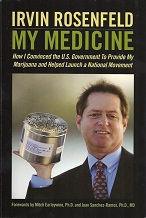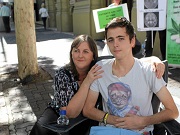Is cannabis oil safe for a 5 year old child?
Is cannabis oil safe enough for children? watch the video below and see what you think.
Canada revised medical marijuana manual lists many adverse effects
New medical marijuana guidelines respond to doctors' complaints about having too little information
Health Canada has significantly expanded its medical marijuana manual for health-care professionals, adding major new sections about the potential adverse effects on the teenaged brain and driving safety.
The document is much larger than the previous 2013 edition, and responds to doctors' complaints about having too little information on the medical science even as they're being asked to authorize marijuana for a growing number of patients.
The heavily revised manual arrives as the Liberals sort out how to legalize recreational marijuana as promised in the federal election – and the document's fresh litany of cautions may provide ammunition to opponents.
CBC News obtained a draft copy of the 158-page manual, dated Dec. 23, 2015, and due to be published this spring, under the Access to Information Act.
The document replaces a three-year-old, 94-page document, and features an "adverse effects" section that is more than 50 per cent longer than its predecessor. The section reviews in greater depth whether cannabis may affect the onset of schizophrenia or psychosis, among many other medical issues.
The older manual also referred only to dried plant, while the new one cites fresh marijuana and oils, which are also now available under a new commercial regime consisting of 30 Health Canada-approved growers shipping to about 37,000 patients. The document also features a new section on vaping, that is, cannabis electronic cigarettes.
New sections on dangers
Like the old document, the expanded "Information for Health Care Professionals" is prefaced with a boldface warning that "it should not be construed as expressing conclusions from Health Canada about the appropriate use of cannabis … for medical purposes."
A section on adolescents has been added to a chapter on fetal and child development; there's new information on "sperm and testicular health;" a new section on depression; more information about therapeutic uses to relieve epilepsy; and five new pages on cannabis and driving.
Caucus 20151202
"Studies have shown that acute cannabis administration (ie. THC) affects areas of the brain involved in perception, attention, concentration, inhibitory/impulsivity control, executive control/decision-making, awareness, alertness, and co-ordination all of which are required to safety operate a motor vehicle," says the expanded version.
The language is dense and the tone balanced, often citing conflicting research and cautioning against hard conclusions, with hundreds of detailed citations throughout.
A spokesman for Rona Ambrose, former health minister and now the Conservative party's interim leader, says she did not direct the department to produce the new manual, whose revisions were begun under her watch. Ambrose has been one of the most outspoken opponents of the Liberal plan to legalize recreational marijuana, which a task force is now considering.
The information is going to be useful in general.
- Dr. Cindy Forbes, president of Canadian Medical Association
"While the update may have been initiated while Ms. Ambrose was still the health minister, it was not done as a result of any direction from her, but rather by non-partisan public servants at Health Canada," said Mike Storeshaw.
"Any additional cautions or warnings would therefore reflect the submissions and evidence they received from the medical community, which have been significant in many cases."
The president of the Canadian Medical Association, Dr. Cindy Forbes, said she welcomes the new manual, especially any new research on cannabis and adolescents.
"We're very concerned about the young developing brain and nervous system, and so if there is new information or clarity around guidelines in this area, it will be welcomed," she said from Halifax, adding that the science can help inform Canadians about recreational marijuana as well.
"I think the information is going to be useful in general."
A spokesman for Health Canada, Sean Upton, said the document reflects international research carried out since the 2013 edition, with sections on potential therapeutic uses of cannabis as well as harmful effects. He said the new evidence about cannabis and youth will also help inform the task force on recreational marijuana.
Input to task force
"The government of Canada has committed to legalizing, strictly regulating and restricting access to marijuana to keep it out of the hands of youth," Upton said.
"Keeping marijuana out of the hands of youth is strongly supported by this evolving evidence base. This and other evidence will be an important input to the task force mandated to examine the issues related to the legalization and regulation of marijuana, and which will consult broadly with experts in public health, substance abuse and law enforcement."
Blair Marijuana 20160224
Health Canada maintains an "adverse reaction" database for drug companies, consumers and others to record incidents involving pharmaceuticals and other substances, including medical marijuana.
Of some 45,000 reports registered in 2014, the first full year in which accredited marijuana firms were required to report adverse incidents, just four cited medical marijuana. Only nine such reports were registered in 2015, with unwanted side effects including paranoia, asthma and dizziness, none of them serious. The database includes voluntary reporting by doctors and patients.
Health Canada issued its first, much slimmer, medical marijuana manual in 2003.
reference: http://www.cbc.ca/news/politics/medical-marijuana-guide-1.3528520
VIC State Parliament approves legalisation of medicinal cannabis
Well it was only a matter of time for medical cannabis legislation to change but, as always, the devil is in the detail.
It seems that there's a plethora of pre clinical and pharmacological evidence to support cannabis is much safer than alcohol for example, yet the fear of the evil weed propaganda of the past 50 years is still very prevalent.
In the new VIC legislation, Non-smokable marijuana products including oils, sprays and vaporisers are acceptable, but nothing that resembles the actual cannabis plant.
Now on the subject of "non-smokable" , combustible plant matter does produce carcinogens, but raw cannabis, such as the flowers from the female plant can be vaporised as an alternative to smoking. Vaporising is a healthier alternative that does not produce carcinogens and can also be titrated, which is great for some illnesses such as PTSD or osteoarthritis.
Whilst we applaud the Victorian government in being the first off the blocks, their fears of medical cannabis being let loose on society are unwarranted.
Regulation is needed to some extent, but what's really needed is more scientific based education and independent research.
It's proven that cannabis, unlike alcohol is not poisonous, scientifically proven. It's also proven that unless someone is predisposed to schizophrenia, meaning it's in their DNA, cannabis does not cause schizophrenia.
As for addiction, this is the next topic on MMA's agenda, and we plan to interview the most knowledgeable academics we can find.
And now for the great news.........
reference; http://www.heraldsun.com.au/news/victoria/state-parliament-approves-legalisation-of-medicinal-cannabis/news-story/cf1365cd0fea0342705077508362b75a?from=herald%20sun_rss#load-story-comments
MEDICINAL cannabis has been made legal in Victoria and will be grown and supplied to patients in Victoria as early as 2017.
The historic Access to Medicinal Cannabis Bill 2015 passed the Victorian parliament just after 6pm.
Children suffering severe epilepsy will be among the first to be treated using a range of non-smokable marijuana products including oils, sprays and vaporisers.
Minister for Health Jill Hennessy welcomed the bill passing.
“Children with severe epilepsy will now be able to legally access this lifesaving treatment from as early as 2017.”
“It is absolutely heartbreaking to see families having to choose between breaking the law and watching their children suffer — and now, thanks to our groundbreaking legislation, they won’t have to.”
Minister for Agriculture Jaala Pulford revealed a small-scale, strictly controlled cannabis cultivation trial at a Victorian research facility was set to begin in April.
“We are on track to deliver on our promise to make medicinal cannabis available to Victorian patients in exceptional circumstances, with the first cultivation trial about to get underway,’’ she said.
Patients must suffer severe epileptic seizures, muscle spasms resulting from multiple sclerosis, severe pain and nausea arising from cancer or HIV/AIDS or chronic pain approved by two specialists.
The new law comes after the Victorian Law Reform handed down 42 recommendations last year including how to dispense the drug through pharmacies to patients who have been prescribed treatment by a medical specialist.
Victorian patients and their families will be able to legally access medicinal cannabis in exceptional circumstances.
Lanai Carter taking legal action against Queensland Department of Health
It's about time someone stood up to the TGA and Health Dept and finally a courageous mother has done just that.
The government setup the "Federal TGA special Access scheme" for those with special needs to allow access to medical cannabis when nothing else could do the trick, we're talking seriously sick people.
MedicalMarijuana.com.au has received many emails from similar cases to Lindsay's and whilst feeling very helpless, have referred them to the "Federal TGA special Access scheme"
Knowing full well the difficulties and red tape they would need to endure to actually procure medical cannabis, specifically for their needs.
Little did we know or could concieve the process could take 8 months. These people don't have time on their side, they need help now/yesterday. There's mountains of anecdotal evidence suggesting cannabis shrinks tumors and kill cancer cells and It's not just anecdotal but also pre-clinical studies.
The government, is so worried that medicinal cannabis will spill over into recreational use.
Well let it be known that those who wish to use cannabis recreationally are already doing it and will continue to do so with or without government permission, this has being going on for quite some time now.
The only difference is that full legalization of cannabis would allow real cannabis education and scientific research. It would also criple criminal activity, if prices were dropped (which should be the case if legalised)
You want to win the WAR ON DRUGS ? legalise it and then educate about the real effects of cannabis use, treat it as a health issue and not as a crime.
Sure, no matter how well you educate, there will always be someone on a self destructive path, but alcohol does a much better job than cannabis if that's your goal, a proven fact.
I applaud the Carter family for initially signing up for the "TGA's special Access scheme" and attempting to play by the rules, but I take my hat off for taking legal action. You deserve to be extremely well compensated for the TGA's and health depts seemingly inept abilities to help terminally ill patients.
But more importantly, I hope Lindsay gets better.
Now for the story; from the Queensland Times
LINDSAY Carter spent Good Friday in Logan Hospital.
The 17-year-old, who has a brain tumour, had suffered a major seizure.
Twelve months ago his mother Lanai Carter sought to facilitate a Special Access Scheme Category B Application for Lindsay’s specific medicinal cannabis products to be prescribed by his Australian medical practitioner, as recommended by his United States physicians.
On February 26 Lindsay’s SAS-Category B application was approved by the TGA.
The problem for Lindsay is he has yet to receive the State Health Director General’s approval, which will see the products with which his tumour has been treated in the United States with staggering success, delivered to an Australian pharmacy.
When Lindsay was diagnosed with a brain tumour at the age of 14, it was deemed too risky to operate due to the location of the tumour in his brain.
Chemotherapy and radiation therapy were also considered too dangerous.
The family has travelled to the United States on four separate occasions where Lindsay’s tumour and seizures were treated successfully with medicinal cannabis.
With no access to prescribed medication in Australia, Lindsay has suffered multiple seizures.
With his health steadily deteriorating before her eyes, and as the family anxiously waits on the relevant state approvals to come through, Ms Carter has now made the decision to commence legal action against the Queensland Department of Health.
Last week Ms Carter, her son and lawyer convened a meeting with the Director General.
“I cannot say we were satisfied enough with the meeting because every day that our son’s medicine is delayed he is at risk of further seizures and deterioration and his life is put at risk,” Ms Carter said.
“While we are now more confident that state approval will be issued next week, the process is still taking too long because Queensland Health are complicating and delaying access by duplicating the federal TGA treatment approval process that Lindsay’s doctor has already been through.
“So having them tell us that they were working on completing this process as quickly as possible and hoping to have it all finalised by the end of next week was of little relief to us, after only having been in hospital on Friday with Lindsay.”
While Ms Carter acknowledges that Lindsay is not only the first patient in Queensland but in Australia to access medical cannabis from overseas through the legal channels, it doesn’t make the wait any easier with his life at constant risk due to seizures and the brain tumour.
“Our son has already endured an 11-month wait for an approval from the Federal TGA special Access scheme. “That process was cumbersome, lengthy, and tortuous to say the least,” she said.
“While the government might finally may be appearing to do something on the surface to fix a problem with our country’s legislation surrounding medical cannabis, on the other hand they over-regulate to the point where it causes unnecessary hardship, delay, expense and stress on the people in this country that need it the least.
“We will not tolerate further unnecessary delays to the application at a state level due to their duplicative processes that have already been completed by TGA at a federal level.
The TGA had already determined Lindsay’s medical right for his doctor to prescribe his medication and its suitability in Lindsay’s case.
Through the application process an extensive review of the licencing, certificates of analysis for the specific medical cannabis products, as well as quality control surrounding the supply from Canada has been completed. However, after the introduction of the state’s Medical Cannabis Bill in February, the Carters were advised that they would need to submit an application to the state.
“The frustrating thing is that this state process is based on a state bill that’s only just been proposed, a bill that’s not even been debated through parliament and most likely won’t even come into legislation until later this year. Yet they want to make my son’s application go through this proposed process before it’s even in law yet,” Ms Carter said.
The Public Health (Medical Cannabis) Bill, if passed, will formalise the process for Queensland doctors to prescribe medicinal cannabis for their patients’ treatment.
Doctors will be able to access medicinal cannabis and will require the same TGA approval that took the Carters 11 months to receive. “Terminally ill patients shouldn’t have to wait weeks or months for approval.
“Everyday Australians are being forced to become criminals to save the lives and ease the suffering of their loved ones.”
reference: http://www.qt.com.au/news/cannabis-law-needs-action/2989434/
Latest
Coronavirus Strikes Massachusetts Cannabis Company Employees
Reassessing the Essential: Cannabis in the Time of a Pandemic
5 Reasons To Try Aspen Valley CBG Flower (30% Off)
High Times Cannabis Cups Go Virtual In Wake Of Coronavirus Pandemic
Drug Enforcement Administration Proposes Plan To Expand Cannabis Research
Ghana Legalizes Cannabis For Medicinal And Industrial Uses
The cheapest legal weed in Canada: Discover these cannabis ‘value brands’
Cannabis and coronavirus: Here’s what you need to know
cannabis designs
The Best Of
WHO Rules CBD Should Not Be a Scheduled Drug

Dr Cristina Sanchez PhD video interview on medical marijuana and cancer

Biochemist Dennis Hill interview; Cannabis oil as a cure for cancer.

The unofficial World Record holder for cannabis smoking part 1









